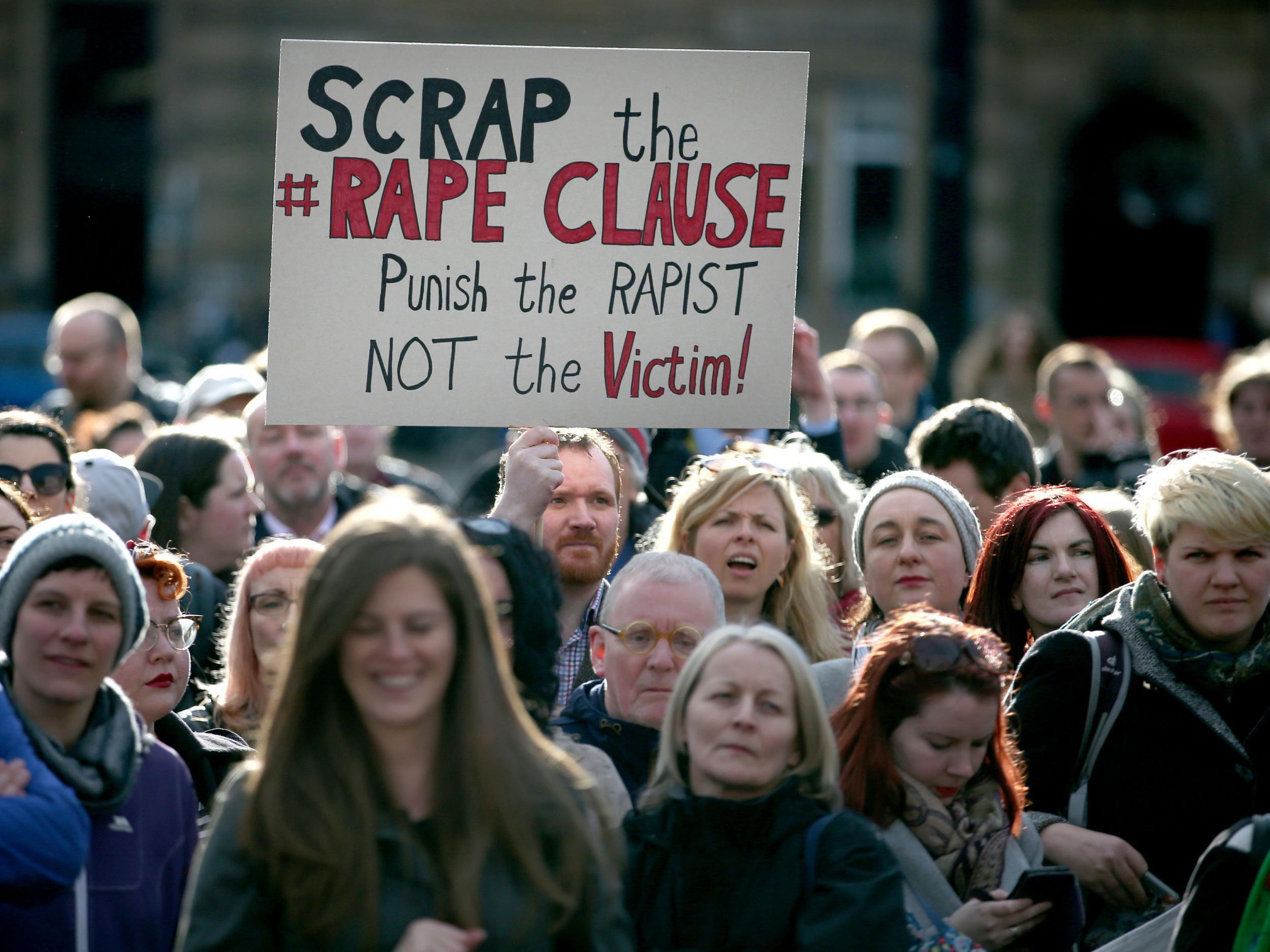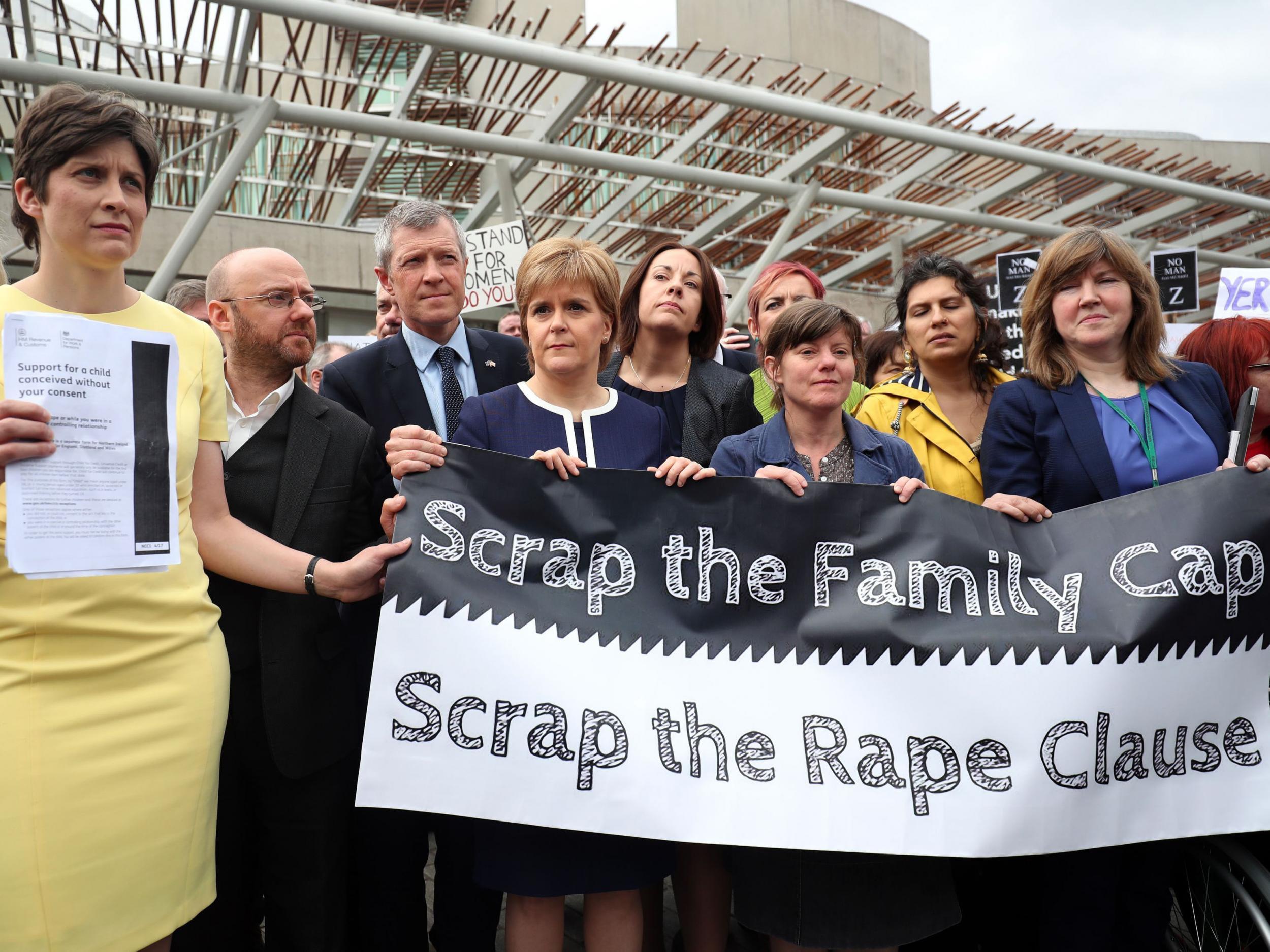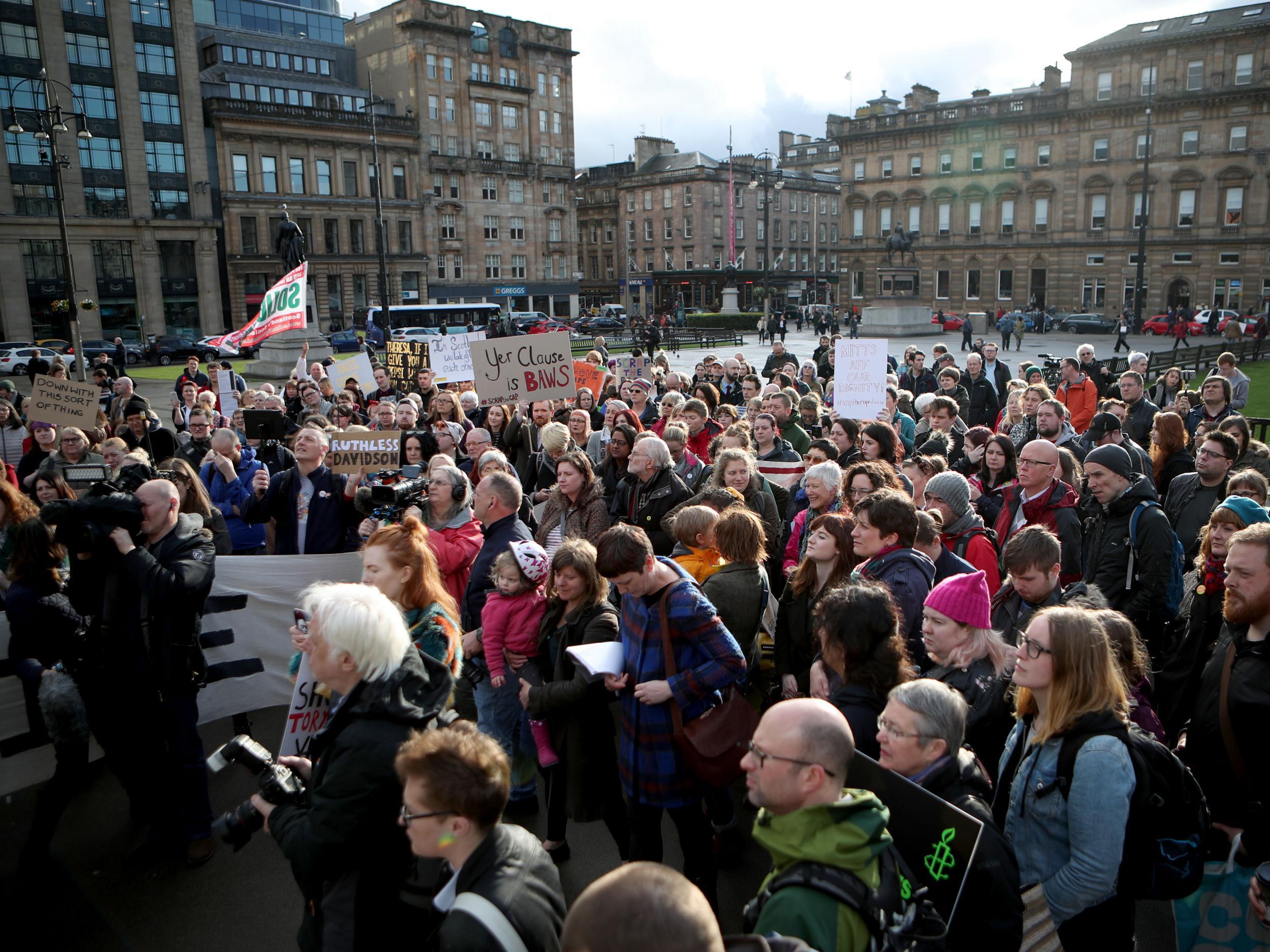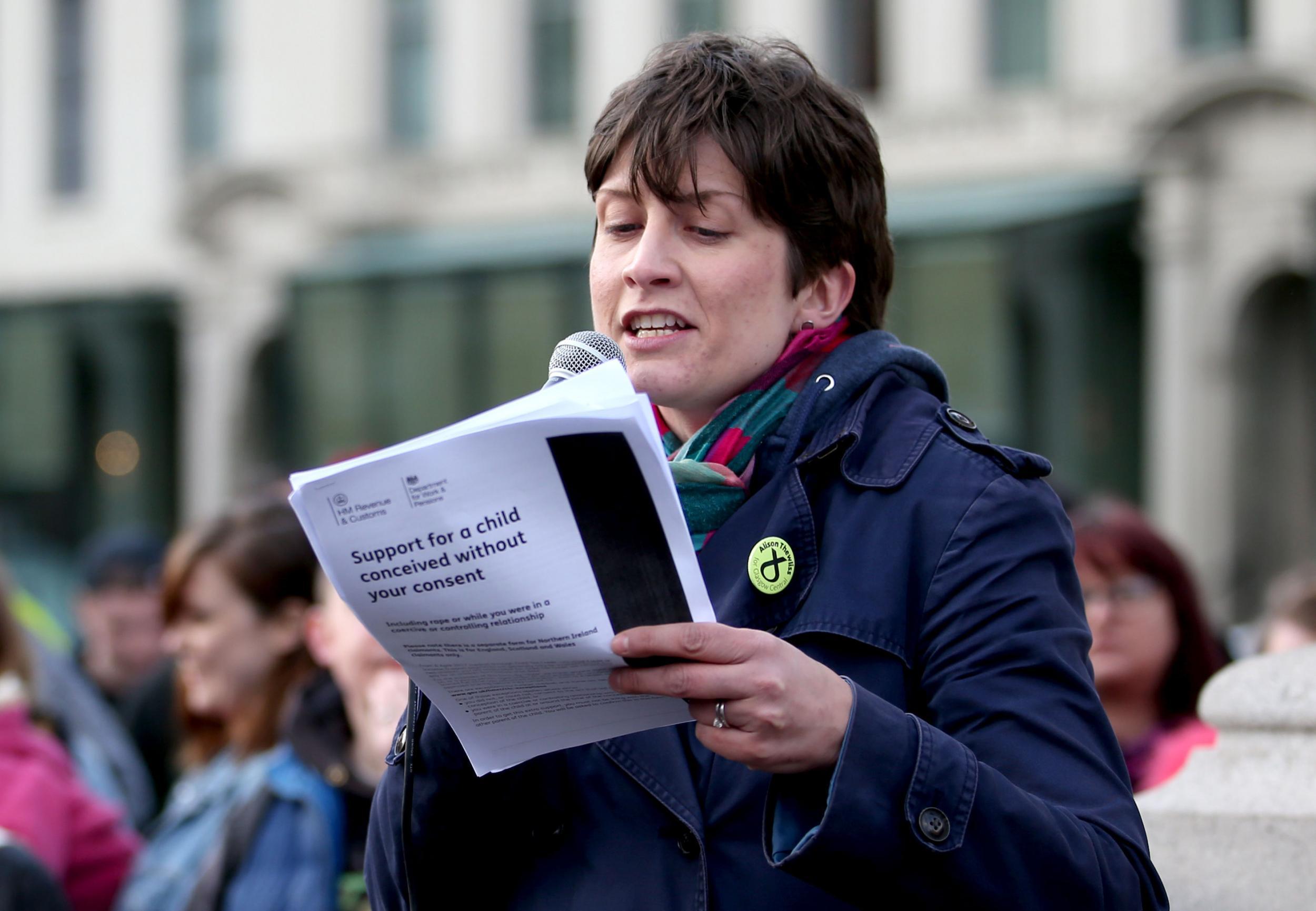The damaging legacy of the rape clause for three or more children
Families with two or more children claiming child tax credit face a bleak reality in policy that campaigners are fighting against

Your support helps us to tell the story
From reproductive rights to climate change to Big Tech, The Independent is on the ground when the story is developing. Whether it's investigating the financials of Elon Musk's pro-Trump PAC or producing our latest documentary, 'The A Word', which shines a light on the American women fighting for reproductive rights, we know how important it is to parse out the facts from the messaging.
At such a critical moment in US history, we need reporters on the ground. Your donation allows us to keep sending journalists to speak to both sides of the story.
The Independent is trusted by Americans across the entire political spectrum. And unlike many other quality news outlets, we choose not to lock Americans out of our reporting and analysis with paywalls. We believe quality journalism should be available to everyone, paid for by those who can afford it.
Your support makes all the difference.On 20 January 2017, all eyes were on Donald Trump. While billions of people watched the former reality television star being sworn into the highest office in the world, the UK government was quietly publishing the response to its consultation on limiting child tax credit to two-child families.
From 6 April that year, any woman claiming the equivalent of £53 per week for a third or subsequent child would have to fit into one of several exceptions – including declaring she had been raped or that she had the child within an abusive relationship.
“The consultation got universal disapprobation,” says Emma Ritch, executive director of Scottish feminist organisation Engender. “And it was only open for one month.”
Campaigners that contributed, such as Child Poverty Action Group, estimate that more than 250,000 children will consequently be pushed into poverty by the end of the decade, representing a 10 per cent increase in child poverty. The Equality and Human Rights Commission (EHRC) urged the government to delay implementation until it had carried out a full impact assessment, otherwise it was at risk of violating human rights law.
The government said it consulted widely on the issue and 52 organisations had submitted evidence. The policy and the rape clause were brought in, under the Welfare Reform and Work Act 2016, with the government declaring it would “restore fairness in the benefit system”.
Now, on the one-year anniversary of this policy, the government faces growing calls from charities and advocacy groups to answer questions as to how data is being collected and how the claims of rape and abuse are being handled by a separate team at HMRC.
“I’ve continued to ask questions, but ministers haven’t given me any answers, or reassurance or justification that this policy is either workable or necessary,” says SNP MP Alison Thewliss.
There is also a lack of clarity over the way in which benefits are being administered, given that the government’s call for third-party referrers, who would verify women have been raped or abused to claim money, has been dismissed by most large charities in Scotland.
“It’s a toxic policy for women’s health and wellbeing that we could not associate with,” says Marsha Scott, chief executive of Scottish Women’s Aid. “It would completely shift the relationship with the women we support. If there’s nobody to implement this policy in Scotland, I would think there might be room for challenging it legislatively or judiciously.”
The government responded that third-party referrers can include social workers, specialist support workers “from an approved organisation”, doctors, midwives, nurses and health visitors.
Within four months of the policy becoming law last year, Child Poverty Action Group issued a claim for judicial review in the High Court against the secretary of state for work and pensions, then Damian Hinds, on behalf of three families.
CPAG solicitor Carla Clarke told The Independent that the two-child policy was “deeply disturbing” and “ultimately unlawful”, treating some children as less deserving than others purely because of the order in which they were conceived.
“It places women, in particular, in the invidious position of deciding whether to continue with an unplanned pregnancy or to have an abortion,” she adds. “It removes the safety net for those families who had three or more children at a time when they were fully able to provide for them but then encounter job loss or sickness.”

The plaintiffs include two lone mothers who gave birth to a third child after the cut-off date. One is on income support, the other on working tax credit. The women did not intend to fall pregnant – one had been on the pill – but neither of them wanted an abortion. In the third household, a child being looked after under a child arrangement order was taken in as the family’s second child before the couple went on to have a natural child of their own. The father works full-time, while the mother is currently on maternity leave from her part-time job.
The case was heard in February this year. Even if the judge agrees with CPAG’s case, the policy still may not be scrapped. (Last June, the High Court ruled that a separate government benefit cap unlawfully discriminated against single parents with children under two. However, in March, the Court of Appeal ruled in favour of the government. The four families that brought the case are now going to the Supreme Court.)
“It’s yet another kick in the teeth after rounds of benefit changes that have left families trapped in poverty and struggling to afford rent or put food on the table,” says Sumi Rabindrakumar, research officer at Gingerbread, a charity that supports single parent families. “We hope that the judicial review judgment [of the two-child limit] recognises the detrimental impact of this policy and puts the needs of children first.”
In Northern Ireland, there is another layer of complexity. It is mandatory to report a crime such as rape, a hangover law from the Troubles, and if the perpetrator is identifiable, for example, the husband of the claimant, the person hearing the woman claimant’s case must report him to the police.
“Many women do not want to engage with the criminal justice system, or report someone that they are in a relationship with to police,” the Women’s Aid Federation Northern Ireland wrote in a statement last year. “They should not be forced to do so to access welfare.”
While the judicial review result is awaited, campaigners say the steam that first built up after April last year became harder to maintain. A petition to scrap the clause reached more than 25,000 signatures but was closed early when Theresa May called a snap election. In August last year, CPAG filed its paperwork. In November, the newly elected petition committee, chaired by Labour MP Helen Jones, forced the government to update its response to the petition, paying more attention to the impact on women. But the policy has not been voted on or debated in Westminster.

In January, Scottish politicians including Thewliss and former Labour leader Kezia Dugdale renewed their calls to Esther McVey, the first woman to be appointed secretary of state for work and pensions, to scrap the policy.
In a letter seen by The Independent, McVey wrote back to Thewliss last month that the policy “strikes the right balance between protecting the vulnerable and encouraging families who receive benefits to make the same financial decisions as those families who support themselves solely through work”. She added that the exceptions were designed to “protect those who are not always able to make choices about the number of children in their family”.
McVey wrote that devolved powers granted to Scotland since September 2016 allow it to either top up benefits such as child benefit, which is not affected under the two-child limit, provide discretionary payments or create new benefits. This argument was echoed by Scottish Tory leader when the clause was debated in Holyrood last April: “If the First Minister [Nicola Sturgeon] doesn’t like the two-child tax policy, she can change it.”
Thewliss responds: “The UK government sets rules on tax credits, they are not devolved, and the two-child limit is within the tax credit system. To say we can mitigate this policy [in Scotland] also ignores the big picture here – the real concern is for women across the UK who are being affected.”
The government estimated it would save almost £2bn by 2021/22 through this policy, reducing income by £2,780 a year for families who have a third child after the cut off date.
Also by the year 2021/22, a March 2018 report from the EHRC found that households with three or more children will see an average drop in their net annual income of £5,150, compared with a loss of £1,600 and £800 for two and one-child households respectively. Three-child families are also hit by limited access to benefits in other areas, such as housing. Thewliss says she had met with parents whose children were also no longer eligible for schemes like Healthy Start vouchers, which give families on certain benefits free milk, fruit and vegetables.

Rob Gowans, policy officer at Citizens Advice Scotland, says the rape clause has been one of the most damaging welfare reforms in recent years, along with the four-year freeze on working age benefits and the bedroom tax of 2012, a cut to housing benefit if you had a spare bedroom in a council house.
“The problem is accumulative – it’s part of a whole range of things that reduce people’s ability to pay for essentials,” he says.
He adds that he would like to see the abandonment of the two-child policy, and it has “a particular impact on women”.
Female lone parents and female single pensioners were hit the hardest by Conservative tax reforms between May 2010 and January this year, the EHRC found, with more than 87 per cent of people in both categories losing money in that period.
“We shouldn’t balance the budget on the back of poor women,” says Ritch. “There remains public concern if not fury that these measures exist in a supposedly civil society.”
A government spokesperson responded, saying: “This policy ensures people on benefits have to make the same choices as those supporting themselves solely through work. But we have always been clear it will be delivered in the most effective, compassionate way, with the right exceptions and safeguards in place.”
But government policy can change overnight, especially with public pressure.
When it was revealed that Universal Credit claimants had to wait up to six weeks for money, the government was forced to review its process. And on 29 March, the government suddenly reversed its 2014 decision to axe housing benefit for anyone under 21, a move that was estimated to hit about 10,000 young people. The call had been backed by celebrities such as Idris Elba.
“Policy can suddenly change even when the government has held out for ages,” says Thewliss. “It would be good if the two-child cap, which disproportionately affects a relatively small number of families, could follow as the next U-turn.”
Join our commenting forum
Join thought-provoking conversations, follow other Independent readers and see their replies
Comments